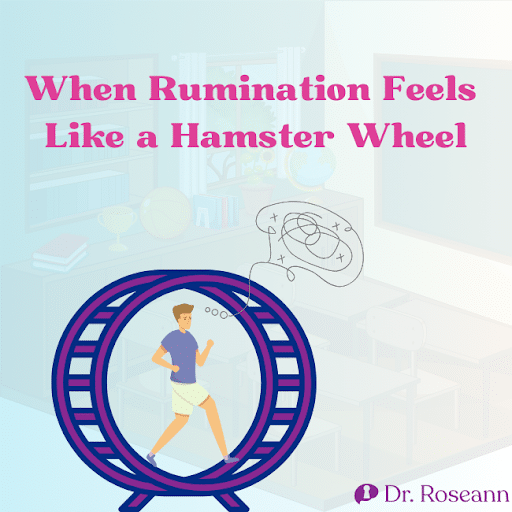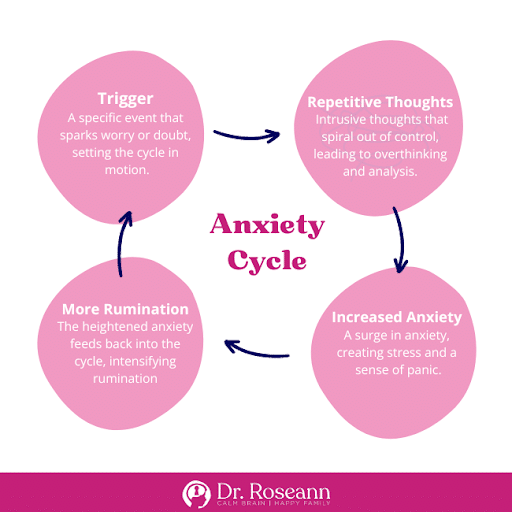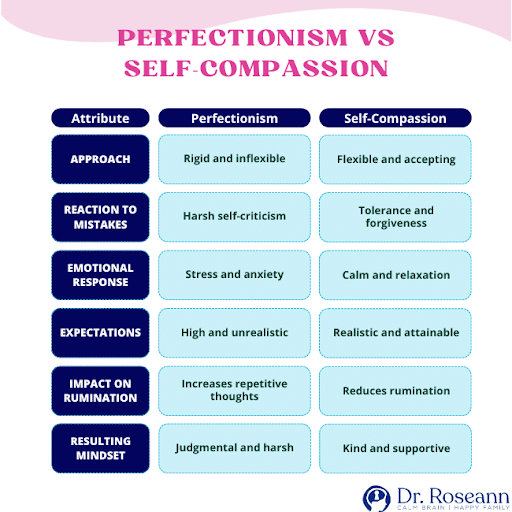Is your child or teen caught in a cycle of rumination and repetitive thoughts, and is there no way to turn off their mind? If your child is dealing with OCD or anxiety, this can be incredibly challenging. In our Ridgefield, CT center, whether working in-person or virtually, kids often report feeling like, “My brain is hijacked.”
When you can’t turn off your brain, the children I work with feel frustrated, anxious and hopeless that they ever can. The parents I work with don’t know what to do or say either.
The good news is that we have helped thousands of children and their families, “Kick anxiety and OCD to the curb!” Let me walk you through the practical steps to break free from rumination and regain control of your thoughts.
What is Rumination, and Why Does it Happen?
Rumination, when it comes to Obsessive-Compulsive Disorder (OCD), is like a mental hamster wheel. It involves repetitive, intrusive thoughts or questions that just keep going in circles without getting anywhere useful. For a child or teenager with OCD, this might look like constantly worrying about making a mistake, overthinking what someone said, or endlessly analyzing whether they've done something “right.”

Rumination often arises from a deep-seated need for control and certainty, which are common traits among individuals with anxiety and OCD. Uncertainties and fears can trigger the relentless cycle of rumination, or a hyperfocus on the negative, and lead to a constant quest for reassurance and validation.
Despite the temporary relief it may provide, rumination ultimately perpetuates feelings of doubt and insecurity. It traps you in a vicious cycle of worry and self-doubt. Recognizing this pattern is the first step towards breaking free from its grip and reclaiming your child’s mental well-being.
For parents, it can be challenging because these thoughts aren't just occasional worries; they're consuming and can lead to a lot of stress for the child. As a result, it may feel like you're having the same conversation or addressing the same concerns repeatedly without finding a clear way to move on. This cycle can affect your child's mood and daily activities, making it important to find support and strategies to manage it.
How to Break the Cycle of Obsessive Thoughts
Ruminative thinking can feel like a never-ending loop, but effective strategies exist to break free from this cycle and regain control of your mind without the need for medications.

Natural Solutions to Break The Rumination Pattern:
1. Recognize the Pattern
The first step to breaking free from rumination is recognizing when it's happening. Pay attention to your child’s thoughts and notice when they become repetitive and intrusive. I once worked with a teen who struggled with rumination about her health. She constantly worries about every little symptom and cannot stop thinking about it. Parents should learn how to recognize patterns like this.
2. Challenge Negative Thoughts
Question the validity of your ruminating thoughts. Are they based on facts or fears? Challenge irrational beliefs and replace them with more realistic perspectives. Remember, these thoughts are not always accurate reflections of reality, and challenging them can help you regain control.
3. Practice Mindfulness
Mindfulness techniques can help you stay grounded in the present moment and reduce rumination. Practice deep breathing, meditation, or yoga to calm your mind and break free from cyclical thinking.
One study examined if doing formal mindfulness exercises, like meditation, or informal ones, like paying attention during daily tasks, made a difference in how much better people felt. They found that doing formal mindfulness exercises, like meditation, helped reduce negative thinking, which made people feel better (Hawley et al., 2013).
4. Engage in Healthy Distractions
Find activities that occupy your child’s mind and bring them joy. Spend more time with your kids. Let then pursue their hobby. Get them exercising and engaging in enjoyable distractions that can disrupt rumination patterns.
5. Challenge Perfectionism
Perfectionism often fuels rumination. Accept that mistakes are a part of life and that your kids don't have to be perfect. Practice self-compassion and remind them that it's okay to make errors. Embrace the process of learning and growth that comes with accepting imperfection.

6. Seek Support
Don't hesitate to seek support from friends, family, or a therapist. Talking about ruminative thoughts can provide relief and perspective. Remember, you don't have to navigate these challenges alone, and reaching out for help is a courageous step toward healing.
7. Address Ruminative Triggers
Identify triggers that exacerbate rumination and take steps to gradually increase exposure to them and find ways to cope.
This could involve setting boundaries with certain people that intensify anxiety because they don’t understand or accommodate. Constant reminders of what you did and didn’t do doesn’t help the intrusive thoughts either. For example, in one study, researchers investigated how people in a non-clinical setting responded when reminded of goals they had either resolved or left unresolved.
Results showed that when participants were reminded of unresolved goals, they experienced more repetitive and intrusive thoughts compared to when they were reminded of resolved goals. Additionally, individuals who tended to ruminate more often in general were more affected by these reminders (Roberts et al., 2013).
8. Practice Cognitive Behavioral Techniques
Cognitive-behavioral therapy (CBT) techniques, such as thought restructuring and exposure therapy, can help you challenge and change ruminative thought patterns. With the guidance of a skilled therapist, you can learn practical tools to effectively manage and overcome rumination, leading to greater peace of mind and well-being.
9. Cultivate Gratitude
Focusing on gratitude can shift your mindset from rumination to appreciation for the present moment. Take time each day to reflect on things you're grateful for, cultivating a positive outlook that counteracts the negative spiral of repetitive thinking.
10. Prioritize Self-Care
Ensuring your physical and emotional well-being is essential for managing rumination and anxiety effectively. Adequate sleep, proper nutrition, and regular exercise support your overall health and play a crucial role in regulating mood and reducing stress levels.
Rumination can feel overwhelming, but you can break free from its grip with persistence and the right strategies. Implement these steps to stop rumination, regain control of your thoughts, and reclaim your peace of mind. If you want to empower your child to rise above anxiety and flourish without relying on medication, download the Natural Thought Tamer Kit.
Is rumination a mental illness?
Rumination itself is not considered a mental illness, but it can be a symptom or feature of several mental health conditions, including depression, anxiety disorders, and obsessive-compulsive disorder (OCD). When rumination becomes excessive, intrusive, and interferes with daily functioning, it may warrant clinical attention and treatment.
Why do we ruminate?
We ruminate for various reasons, including trying to problem-solve, understand complex emotions, or process past experiences. However, excessive rumination often occurs when we're stuck in negative thought patterns, struggling with unresolved issues, or experiencing high levels of stress, anxiety, or depression. It can also be a way of avoiding difficult emotions or situations.
Why do I ruminate so much?
Ruminating excessively can be influenced by various factors, including personality traits, past experiences, and mental health conditions like anxiety or depression. It may also stem from a tendency to dwell on negative thoughts or unresolved issues.
Is rumination a symptom of anxiety?
Rumination can be a symptom of anxiety, particularly in generalized anxiety disorder (GAD) or social anxiety disorder (SAD). It often involves repetitive and intrusive thoughts focused on worrying about future events, potential threats, or perceived inadequacies. Rumination can exacerbate anxiety symptoms and contribute to a cycle of negative thinking and increased anxiety levels.
How do I stop thinking about something?
One way to stop thinking about something is to distract yourself with activities you enjoy or tasks that require focus. Additionally, practicing mindfulness techniques, such as deep breathing or meditation, can help shift your attention away from intrusive thoughts.
How do you stop obsessive thinking?
Stopping obsessive thinking can be challenging, but techniques like cognitive behavioral therapy (CBT) can help by identifying and challenging irrational thoughts. Additionally, practicing mindfulness can teach you to observe your thoughts without getting caught up in them, reducing their power over you.
Why do I keep thinking about my past mistakes?
Continuously dwelling on past mistakes can be influenced by feelings of guilt, shame, or a desire to avoid similar situations in the future. It's also common when struggling with low self-esteem or perfectionism. Working on self-compassion and forgiveness, as well as learning from mistakes rather than dwelling on them, can help break this cycle.
How to fight OCD compulsions?
Fighting OCD compulsions involves gradually exposing yourself to the triggers while resisting the urge to perform the compulsive behavior. This is called exposure and response prevention (ERP) therapy. Additionally, cognitive-behavioral techniques can help challenge irrational beliefs driving the compulsions, and seeking support from a therapist experienced in treating OCD can provide guidance and accountability throughout the process.
How to support someone with ocd intrusive thoughts?
Supporting someone with OCD intrusive thoughts involves being understanding, patient, and non-judgmental. Encourage them to seek professional help from a therapist specializing in OCD treatment, such as cognitive-behavioral therapy (CBT) or exposure and response prevention (ERP) therapy.
Is making up scenarios in your head normal?
Yes, it's normal for people to create scenarios or imagine different outcomes in their heads. This can be a way of exploring possibilities, problem-solving, or simply entertaining oneself. However, if these scenarios become obsessive, intrusive, or interfere with daily functioning, it may be a sign of underlying issues such as anxiety or OCD.
Why am I so negative all the time?
Feeling negative all the time can stem from various factors, including past experiences, learned behaviors, cognitive biases, or underlying mental health conditions like depression or anxiety. It could also be influenced by current stressors or environmental factors.
What to do when you feel yourself spiraling?
When you feel yourself spiraling, take deep breaths to ground yourself, challenge negative thoughts by questioning their validity, and reach out to someone you trust for support and perspective. Engaging in self-care activities and seeking professional help if needed can also be beneficial in managing overwhelming emotions.
Citations
Hawley, L. L., Schwartz, D., Bieling, P. J., Irving, J., Corcoran, K., Farb, N. A. S., Anderson, A. K., & Segal, Z. V. (2013). Mindfulness Practice, Rumination and Clinical Outcome in Mindfulness-Based Treatment. Cognitive Therapy and Research, 38(1), 1–9. https://doi.org/10.1007/s10608-013-9586-4
Roberts, H., Watkins, E. R., & Wills, A. J. (2013). Cueing an unresolved personal goal causes persistent ruminative self-focus: An experimental evaluation of control theories of rumination. Journal of Behavior Therapy and Experimental Psychiatry, 44(4), 449–455. https://doi.org/10.1016/j.jbtep.2013.05.004
Dr. Roseann is a mental health expert in OCD and Anxiety who frequently is in the media:
- What if it's Not Depression (Video) Anxiety, OCD and Trichotillomania
- Epidemic Answers Neurofeedback for ADHD, Anxiety, OCD and Mood
- Epidemic Answers: Neurofeedback for ADHD, anxiety, OCD and mood
- Cai Grahm: Is it anxiety or OCD?
Always remember… “Calm Brain, Happy Family™”
Disclaimer: This article is not intended to give health advice and it is recommended to consult with a physician before beginning any new wellness regime. *The effectiveness of diagnosis and treatment vary by patient and condition. Dr. Roseann Capanna-Hodge, LLC does not guarantee certain results.
Are you looking for SOLUTIONS for your struggling child or teen?
Dr. Roseann and her team are all about science-backed solutions, so you are in the right place!
Grab your complimentary copy of
147 Therapist-Endorsed Self-Regulation Strategies for Children: A Practical Guide for Parents
Dr. Roseann is a Children’s Mental Health Expert and Licensed Therapist who has been featured in/on hundreds of media outlets including The Mel Robbins Show, CBS, NBC, PIX11 NYC, Today, FORBES, CNN, The New York Times, The Washington Post, Business Insider, Women’s Day, Healthline, CNET, Parade Magazine and PARENTS. FORBES called her, “A thought leader in children’s mental health.”

She coined the terms, “Re-entry panic syndrome” and “eco-anxiety” and is a frequent contributor to media on mental health.
Dr. Roseann Capanna-Hodge has three decades of experience in working with children, teens and their families with attention-deficit hyperactivity disorder (ADHD), autism, concussion, dyslexia and learning disability, anxiety, Obsessive Compulsive Disorder (OCD), depression and mood disorder, Lyme Disease, and PANS/PANDAS using science-backed natural mental health solutions such as supplements, magnesium, nutrition, QEEG Brain maps, neurofeedback, PEMF, psychotherapy and other non-medication approaches.
She is the author of three bestselling books, It’s Gonna Be OK!: Proven Ways to Improve Your Child's Mental Health, The Teletherapy Toolkit, and Brain Under Attack. Dr. Roseann is known for offering a message of hope through science-endorsed methods that promote a calm brain.
Her trademarked BrainBehaviorResetⓇ Program and It’s Gonna be OK!Ⓡ Podcast has been a cornerstone for thousands of parents facing mental health, behavioral or neurodevelopmental challenges.
She is the founder and director of The Global Institute of Children’s Mental Health, Neurotastic™Brain Formulas and Dr. Roseann Capanna-Hodge, LLC. Dr. Roseann is a Board Certified Neurofeedback (BCN) Practitioner, a Board Member of the Northeast Region Biofeedback Society (NRBS), Certified Integrative Mental Health Professional (CIMHP) and an Amen Clinic Certified Brain Health Coach. She is also a member of The International Lyme Disease and Associated Disease Society (ILADS), The American Psychological Association (APA), Anxiety and Depression Association of America (ADAA) National Association of School Psychologists (NASP), International OCD Foundation (IOCDF).
© Roseann-Capanna-Hodge, LLC 2024











